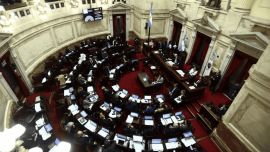World leaders appealed for calm Friday after reported Israeli retaliation against Iran added to months of tense spillover from the war in Gaza, with Iranian state media reporting explosions in a central province.
There was no immediate reaction from Israeli or Iranian officials.
Israel had warned it would hit back after Iran fired hundreds of missiles and drones at it almost a week ago, in retaliation for a deadly strike – which Tehran blamed on its regional foe – that levelled Iran's consular annex at its Embassy in Syria.
Air defence systems over several cities were activated, state media reported Friday, after Iran's official broadcaster said explosions were heard near Isfahan city, in the province of the same name.
An anonymous Israeli official told The Washington Post the "strike" was retaliation for Iran's drone and missile barrage and intended to signal that Israel had the ability to hit inside Iran.
Iran's Tasnim news agency, citing "informed sources", denied that Iran had been attacked from outside.
"Contrary to the rumours and claims" made in foreign media, "there are no reports of an attack from abroad," Tasnim said.
Three Iranian officials told The New York Times that small drones carried out the "attack," possibly launched from inside Iran, and that its radar systems had not detected unidentified aircraft entering Iranian airspace.
Fars news agency reported "three explosions" close to Qahjavarestan, near Isfahan airport and the 8th Shekari army airbase.
Iran's space agency spokesman Hossein Dalirian, referring to a type of drone, said there was "a failed and humiliating attempt to fly quad-copters, which were shot down."
There were "no reports of a missile attack," Dalirian said on social media platform X.
"Reports indicate there was no major damage or large explosions caused by the impact of any air threat," the official IRNA news agency said.
Nuclear sites undamaged
Iran's Army commander-in-chief Abdolrahim Mousavi attributed Friday's explosions to "the firing of anti-aircraft defence systems on a suspicious object."
He said there was "no damage" and the scale of the incident was being assessed, according to Tasnim.
Nuclear facilities in Isfahan were reported to be "completely secure," Tasnim said, and the UN's atomic watchdog confirmed "no damage" to Iran's nuclear sites.
Washington received advance notice of Israel's reported strike, but did not endorse it or play any part in its execution, US media quoted officials as saying.
US President Joe Biden had promised "ironclad" support for Israel, but also urged it to "think carefully and strategically" before launching a response against Iran that could trigger a wider war.
Overnight last Saturday-Sunday Iran launched its first-ever attack directly targeting Israel.
Along with the United States and other allies, Israel intercepted most of the more than 300 missiles and drones which Israel said Iran had launched. Minor damage and no deaths resulted.
Iran attacked in retaliation for the April 1 strike on its Damascus consulate which killed seven of its Revolutionary Guards, including two generals.
Israeli Prime Minister Benjamin Netanyahu has been under international pressure over the civilian toll in Gaza's war, and an analyst said the consular strike allowed Israel to take the focus off Gaza.
However, foreign ministers of the G7 group of developed economies, meeting in Italy on Friday, kept up that pressure.
The group said they opposed a "full-scale military operation in Rafah," where most of Gaza's population is sheltering, because it would have "catastrophic consequences" for civilians.
Israel has for two months threatened to send troops in against Hamas in Rafah.
Domestically, protesters late Thursday again called for Netanyahu's government to make a deal to bring home hostages held by Hamas.
Alongside the Gaza war, violence involving Iran-backed groups has soared throughout the Middle East.
Netanyahu, who has vowed to destroy Hamas over its October 7 attack on Israel that started the war, had stressed that Israel "reserves the right to protect itself" against Iran.
UN Secretary-General António Guterres on Friday called for an end to "the dangerous cycle of retaliation", his spokesman said.
On Thursday Guterres told the UN Security Council that spiralling tensions could devolve into a "full-scale regional conflict."
Analysts said Friday the situation remains dangerously explosive, but the limited nature of Israel's reported strike and the restrained immediate Iranian reaction shows both sides, in particular Tehran, are looking to pull back for now.
Iranian President Ebrahim Raisi, in a speech on Friday, hailed the missile and drone strike on Israel but made no mention of the blasts in Iran earlier.
Syria, Lebanon
On Tehran's streets, some called for peace.
"We are against war," said Behrouz, 71, a retired firefighter who did not give his surname. "We are not happy with the killing of people, whether they are Iranians, Israelis, or Gazans."
Washington, Israel's main ally and military supplier, unveiled sanctions over Iran's drone programme, as did the European Union.
China, Iran's largest trade partner, said Friday it will "continue to play a constructive role to de-escalate" Middle East tensions.
Russia said it made clear to Israel that Iran, Moscow's ally, "does not want escalation."
US Secretary of State Antony Blinken said the G7 is committed to lowering tensions in the Middle East.
Until its drone and missile attack, Iran and Israel had for years engaged in a shadow war, with Tehran accusing its adversary of sabotage and assassinations targeting its nuclear programme, carried out alongside the United States.
Syria and Lebanon also felt fallout from the Gaza war on Friday.
Israeli strikes hit southern Syria, Syria's government and a monitor said. The defence ministry said air defence sites were targeted, and the Britain-based Syrian Observatory for Human Rights said the target was an army radar position.
On the Israel-Lebanon border, where Israeli forces and Iran-backed Hezbollah militants have exchanged regular fire during the Gaza war, Israel's military said an air strike on Ayta ash Shab in southern Lebanon hit "a Hezbollah military structure" and militants there.
– TIMES/AFP






















Comments